新编英语教程5 Unit Ten
新编英语教程5课文翻译(unit1-15)

新编英语教程5课文翻译(unit1-15) Unit 1 恰到好处你见过一个笨手笨脚的男人往箱子上钉钉子吗?只见他左敲敲,右敲敲,说不准还会将整个钉子锤翻,结果敲来敲去到头来只敲进了半截。
而娴熟的木匠就不这么干。
他每敲一下都会坚实巧妙地正对着钉头落下去,一钉到底。
语言也是如此。
一位优秀的艺术家谴词造句上力求准确而有力地表达自己的观点。
差不多的词,不准确的短语,摸棱两可的表达,含糊不清的修饰,都无法使一位追求纯真英语的作家满意。
他会一直思考,直至找到那个能准确表达他的意思的词。
The French have an apt(贴切的) phrase for this. They speak of “le mot juste,”法国人有一个很贴切的短语来表达这样一个意思,即“le mot juste”, 恰到好处的词。
有很多关于精益求精的作家的名人轶事,比如福楼拜常花几天的时间力求使一两个句子在表达上准确无误。
在浩瀚的词海中,词与词之间有着微妙的区别,要找到能恰如其分表达我们意思的词绝非易事。
这不仅仅是扎实的语言功底和相当大的词汇量的问题,还需要人们绞尽脑汁,要观察敏锐。
选词是认识过程的一个步骤,也是详细描述我们的思想感情并表达出来使自己以及听众和读者深刻理解的一个环节。
有人说:“在我思想未成文之前,我怎么知道自己的想法?”这听起来似乎很离谱,但它确实很有道理。
It is hard work choosing the right words, but we shall be rewarded by thesatisfaction that finding them brings. The e某act use of language gives us mastery(掌握) over the material we aredealing with. Perhaps you have been asked “What sort of a manis so-and-so(等)?” You begin: “Oh, I think he’s quite anice chap (家伙)but he’s rather…” and then you hesitate trying to find a word or phrase to e某press what it is abouthim that you do n’t like, that constitutes(构成) hislimitation. When you find the right phrase you feel that your conception of the man is clearer and sharper.寻找恰如其分的词的确是件不容易的事。
新编英语教程5Unit10Things,TheThrow-AwaySociety

Unit TEN: TEXT IWords and ExpressionsParagraph 1Eminently (l. 4) (Note 1): very; perfectly; elegantly 不寻常地,非常E.g.: The discussion is eminently practical. 讨论非常实际。
His articles are eminently comprehensible. 他的文章特别易于理解。
Little girls adore Barbie because she is highly realistic and eminently dress-upable (l. 4) (Note 1): The reason why Barbie appeals so much to little girls is that she looks just like a real-life person who can be dressed up in the way they wish.Paragraph 2humanoid (l. 10): (esp. of a machine) having human shape or qualities 似人的,有人类特点的-oid: like; in the form ofE.g.: metalloid (like a metal) Mongoloid (like Mongolian)trade-in allowance (l. 11) (Note 3):The amount of money a shop deducts from the price of a new thing which a customer buys when he turns in an old one to the shop 以旧换新打折价跳楼价cut-throat price; the lowest price疯狂甩卖crazy sale; crazy dropped price大减价price cutting冬季大减价Winter Crazy SaleMoreover, Mattel announced that, for the first time, any young lady wishing to purchase a new Barbie would receive a trade-in allowance for her old one. (ll. 10-11)Besides, Mattel made public that, for the first time, all girls desirous of buying a Barbie from its company were to be given the right of turning in their old dolls in exchange for new models at a reduced price.Paragraph 4texture (l. 18): the degree of roughness or smoothness, coarseness or fineness, of a surface, substance, or material, esp. as felt by touch 质地,纹理,结构iridescent (l. 18): showing changing colors as light falls on it 色彩斑斓的,彩虹般的E.g.: Soap bubbles are iridescent. 肥皂泡沫色彩斑斓。
新编英语教程 5 Unit 10 教案
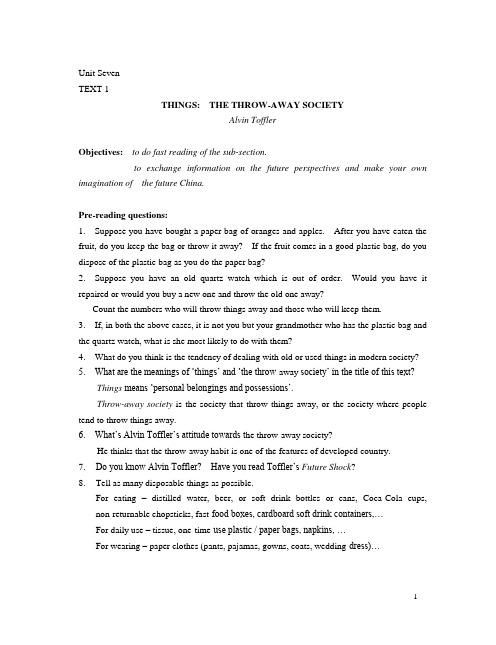
Unit SevenTEXT 1THINGS: THE THROW-AWAY SOCIETYAlvin TofflerObjectives: to do fast reading of the sub-section.to exchange information on the future perspectives and make your own imagination of the future China.Pre-reading questions:1. Suppose you have bought a paper bag of oranges and apples. After you have eaten the fruit, do you keep the bag or throw it away? If the fruit comes in a good plastic bag, do you dispose of the plastic bag as you do the paper bag?2. Suppose you have an old quartz watch which is out of order. Would you have it repaired or would you buy a new one and throw the old one away?Count the numbers who will throw things away and those who will keep them.3. If, in both the above cases, it is not you but your grandmother who has the plastic bag and the quartz watch, what is she most likely to do with them?4. What do you think is the tendency of dealing with old or used things in modern society?5. What are the meanings of ‘things’ and ‘the throw-away society’ in the title of this text?Things means ‘personal belongings and possessions’.Throw-away society is the society that throw things away, or the society where people tend to throw things away.6. What’s Alvin Toffler’s attitude towards t he throw-away society?He thinks that the throw-away habit is one of the features of developed country.7.Do you know Alvin Toffler? Have you read Toffler’s Future Shock?8.Tell as many disposable things as possible.For eating –distilled water, beer, or soft drink bottles or cans, Coca-Cola cups, non-returnable chopsticks, fast-food boxes, cardboard soft drink containers,…For daily use – tissue, one-time-use plastic / paper bags, napkins, …For wearing – paper clothes (pants, pajamas, gowns, coats, wedding-dress)…In-reading discussion:Paras.1-6Paras. 1 - 31. T. begins with an example of Barbie doll. What is a Barbie doll like? Do you like it?It is a twelve-inch plastic teenager with big round eyes, long eyelashes, curly long hair, a twist-and-turn-waist, wearing beautiful long skirt. It is highly realistic, humanoid and adored especially by little girls. The reason why Barbie doll appeals so much to little girls is that she looks like a real person in real life who can be dressed up in the way they wish. (Little girls adore Barbie because she is highly realistic and eminently dress-upable.)(LW7-1) Dress-upable = dress-up + able = that can be dressed up2.Scan the 1st two paras. For the information on Barbie dolls and tell what you know aboutthem.The year when it came into the world: 1959Its population: 12,000,000, more than the human population of Los Angels or London or Paris. Matel, Inc.’s Barbie doll is the best-known and best-selling doll in the world.The manufacturer: Mattel, Inc. Not only selling dolls, but also some accessory products as Barbie’s clothes including ordinary day-time wear, formal party wear, swimming wear, and skiiing wear.New way of sale: trade in the old Barbie for a technologically improved model. I.e. to turn back or turn in to the shop the old one and pay less when buying a new one. Mattel made public that, for the first time, all girls desirous of buying a Barbie from its company were to be given the right of turning in their old dolls in exchange for new models at a reduced price. (Moreover, Mattel announced that, for the first time, any young lady wishing to purchase a new Barbie would receive a trade-in allowance for her old one.) (LW7-2)trade-in allowance = the sum of money given to the customer who turns in the old object in exchange for the new one. / the amount of money a shop deducts from the price of a new thing which a customer buys when he turns in to the shop an old thing. (note 1) trade in sth old for sth new = turn in the old for the new by paying less3. What’s the function of the Barbie doll example at the beginning of the essay? (Why is this not an isolated example?) (comp.3-1)It is used to introduce and illustrate the thesis, which occurs at the end of the thirdparagraph: man’s relationships with things are increasingly temporary.In the first three paras. T gives the example of the Barbie doll, which leads to the initial presentation of his thesis, i.e., man-thing relationships are increasingly temporary. (Org. & Devl.)This is not an isolated example for two reasons:a. The thesis it illustrates is repeatedly illustrated and supported by more examples in the rest of the essay.b.The little girl who trades in her Barbie doll is referred to again in the 7th paragraph. Para.41. Which are more in numbers, man-made objects or natural ones in the sentence The ocean of man-made physical objects that surrounds us is set within a larger ocean of natural objects. (note 2) But increasingly, it is the technologically produced environment that matters for the individual. (LW7-3)There are many more natural objects than man-made physical objects.The word ‘ocean’ is used to mean ‘large quantities’. (comp.3-2)But more and more, man-made products form a very important part in the lives of people.2. The texture of plastic or concrete, the iridescent glisten of an automobile under a streetlight, the staggering vision of a cityscape seen from the window of a jet - these are the intimate realities of his existence.a. texture = the degree of roughness or smoothness, coarseness or fineness, of a substance or material, esp. as felt by touch; visual and tactile qualities of a surfacee.g. The texture of the textile is too loose / very close.b. glisten = shine (more generic)c. staggering = stunning, wondrous, breathtakingd. cityscape< -scape: scenery, cityscape, landscape, snowscape, ...e. How do you understand the phrase intimate realities of his existence? (comp.3-3)Things that are closest and most immediate to his life.Everywhere is viewed plastic objects (things most often used in daily life as kitchen vessels, clothes-hanger, wardrobe, etc.), the concrete buildings, the automobiles, the streetlights, you can see all these intimate realities(things closely related to people’s life) from the window of a jet, or when standing at the top or higher floor of a skyscraper.3. Paraphrase Man-made things enter into and color his consciousness.(LW7-4)Their number is expanding with explosive force, both absolutely and relative to the natural environment. (LW7 - 5)Technologically produced things come to be accepted by people and are beginning to shape their mentality.There has been a tremendous increase in machine-produced things in terms of their actual amount as well as their physical size in proportion to our natural environment. Their number skyrockets / increases at rapid speed, which is faster than that of the growth of the natural environment.4. What does the last sentence in Para.4 imply: This will be even more true in super-industrial society than it is today.?It implies that the expanding number of man-made objects is typical of a highly industrialized society.The thesis as stated in the previous para. Is that man-thing relationships are more and more transient. Now in this para., T. Tries to tell us that we are surrounded by a large ocean of man-made physical objects. They play an important role in our life.Para. 51.But Anti-materialists tend to deride the importance of things.Anti-materialists devalue / despise material wealth.2. Does Toffler agree or disagree with anti-materialists? Why or why not?He doesn’t agree with anti-materialists. He thinks that things are highly significant, having two functions: functional utility and psychological impact.3. How do you interpret these two functions?functional utility: Things can be utilized widely in daily life and in all walks of life to serve and help people in some way. Human beings depend high ly on materials. They can’t live without getting into any connection with things. We develop relationships with things.psychological impact: Materials also have strong impact on people’s mentality. Things affect our sense of continuity or discontinuity (continue using the same thing or stop using it / throw it away).The thoughts, the attitudes, or the value judgements of those who possess a good wealth of materials are quite different from those poor in physical objects. e.g. the throw-away habit ...So things are important with these two functions. They provide us with a kind of living situation or condition of material wealth. The temporary relationships between man andthing quicken our pace of life. (ll28-9)Para.61. Moreover, our attitudes toward things reflect basic value judgments.As stated in the previous paragraph, people with rich materials have different attitude toward things from those with little materials. These different attitudes result in different value judgments.This sentence is the topic sentence, which is developed by showing a contrast on the ways in which little girls and their elder generations deal with Barbies.2. What are the different ways in which little girls and their elder generations deal with Barbies?i.e. Paraphrase Nothing could be more dramatic than the difference between the new breed of little girl who cheerfully turn in their Barbies for the new improved model and those who, like their mothers and grandmothers before them, clutch lingeringly and lovingly to the same doll until it disintegrates from sheer age. (LW7-6)Little girls would like to turn in their Barbies for the new improved model. They are delightd in replacing their out-of-date Barbies for up-to-date ones, while their mothers and grandmothers would clutch lingeringly and lovingly to the same doll until it disintegrates from sheer age. They are reluctant to part with their dear little dolls until they are timeworn and broken / until they fall apart because of long-time use.The elder generation would like to keep all the old and sometimes worn-out things in their house. When moving, not throw them away, so a pile / mount / mass of useless things in the house.This difference seems most noticeable between the modern throw-away-oriented girls and their old-fashioned counterparts. This is a contrast between past and future, between permanence and transience.Another section entitled THE PAPER WEDDING GOWN1.What is this section about?To illustrate the thesis by examining the culture surrounding the little girl who trades in her Doll, which is shown in the 1st sentence – the topic sentence.2.What is the throw-away culture surrounding us in modern society? Or, what are thedisposable things often used in our life?We are living in a throw-away culture in which physical objects pass into and out of our life at a rapid clip. We have one-time-use …, throw-away …, non-returnable …, disposable …, (Diapers, bibs, paper napkins, Kleenex, towels, non-returnable soda bottles, baking tins for corn muffins, plastic sacks for heating spinach, throw-away trays, Coca-Cola cups, non-returnable chopsticks, fast-food lunch boxes, paper handkerchiefs (tissues), disposable cigarette lighters, cardboard milk containers, cardboard soft drink containers, one-time-use toothbrush and toothpaste in hotels, paper apparels / clothes, ...)Our home seems like a large processing machine through which objects flow, entering and leaving, at a faster and faster rate of speed.This long list of throw-away objects for daily use shows the throw-away culture in which the younger generation are embedded.3.Paraphrase the first sentence The idea of using a product once or for a brief period andthen replacing it, runs counter to the grain of societies or individuals steeped in a heritage of poverty.(LW7-7)The practice whereby people use a product and then quickly discard it may readily be rejected by those accustomed by scarcity to holding on to their old possessions.The poverty-stricken people would like to keep things rather than discard them. So the idea of using a product once or for a brief period and then replacing it goes against the idea and practice of the poor people.4. What’s the topic sentence of the 8th paragraph? Is it adequately develop ed by the evidence that follows in the paragraph? (comp. 3-5)The first sentence acts as the topic sentence, developed by the example of French housewives in their attitude towards an ad on a kind of plastic throw-away curtain. They resist this throw-away product strongly.It is not adequately developed. While the French can be regarded as a nation disposed to keeping things, even old things, they are not typically a nation steeped in a heritage of poverty. Therefore, the topic sentence is only partially developed.5. What does the last sentence in the 8th para. imply: This resistance, however, is dying all over the developed world.It indicates that the more developed the society, the less the resistance to throw away things. The more developed society, the more throw-away things. So the development ofthe throw-away culture is entailed by industrialization. (comp.3-6)6. Examples of other industrialized countries in which the throw-away culture has been gradually fostered since the late 50’s are given in para. 9.French housewives refused to use plastic throw-away curtain, but now in France, disposable cigarette lighters are commonplace.In Sweden, there were no beer and soft drink bottles by the roadsides, but by the 60’s, bottles were blooming / scattering along the highways.In Japan today, throw-away tissues are so universal that cloth handkerchiefs are regarded as old fashioned, not to say unsanitary.In England the throw-away / one-time-use toothbrushes coated with toothpaste are very popular and cheap to purchase, costing sixpence only.In this Para. the US and Sweden are contrasted to show how the latter was transformed into a throw-away society in the late 50’s, so are France in the past and France nowadays.7.Paras.10-12 give the example of the introduction of paper clothes products to showpeople’s psychological need for throw-away things and the trend to maintain a transient relationship between man and man-made objects.Gaily colored and imaginatively designed paper apparel, breathtakingly sumptuous gowns, coats, pajamas, even wedding dresses with a long white train of lace-like paper, … These paper clothes can be used as curtains after one-time use, or thrown away if spilled with ice cream, or drawn pictures on, made cutouts on, etc. In addition to the conveniences, they are also cheap / economic in price, cheaper for the consumer to buy and discard a new one than to send an ordinary dress to the cleaners. These two are not the only reasons for the extension of throw-away culture. The throw-away mentality is another important factor that has given rise to the profusion of paper clothes products in the market. (comp. 3-9) For psychological satisfaction, people like to buy and use things which they can throw away after using them only once or for a brief period of time. (But more than economics is involved, for the extension of the throw-away culture has important psychological consequences.)8. cleanly = adj. having clean habits cf. clean = adj. not dirtyblooming = (figuratively used to show the meaning of ) increasedentamatic =(maybe a blend word) dental + automatic e.g. Singtel = S’pore telecom ...9. Fashionable boutiques and working-class clothing stores have sprouted whole departments devoted to gaily colored and imaginatively designed paper apparel.a. Why does Toffler make mention of both fashionable boutiques and working-class clothing stores?(comp.3 - 7)To show the widely-based acceptance of paper clothes in the US.b. sprout:figuratively usedc. devoted to = (here) selling10. Thus a department store features simple A-line dresses made of what it calls ‘devil-may-care cellulose fiber and nylon’.feature = have the feature of, (here) like to selldevil-may-care (materials) = materials so fashionable that even the devils will care or noticeMaybe fiber and nylon are very cheap clothing materials so they cost less than others. 11. What does the incomplete sentence Soon it will be. mean? (comp.3-8)Soon it will be cheaper for the customer to buy and discard a new one than to send an ordinary dress to the cleaners.12. What’s the function of the last paragraph?ConclusionWe develop a throw-away mentality to match our throw-away products, because throw-away products have psychological impact on people. Materials and spirits are closely related, with the former deciding the latter.This mentality produces a set of radically altered values with respect to property, as stated in Para.6: our attitudes toward things reflect basic value judgments.But the spread of disposability through the society also implies decreased duration in man-thing relationships, which is a restatement of the thesis: man-thing relationships are temporary.Instead of being linked with a single object over a relatively long span of time, we are linked for brief periods with the succession of objects that supplant it. This is another way to state out the thesis.Analysis - The thesis1. What do you define the thesis?The thesis, the main idea or controlling idea, tells what you are trying to demonstrate or prove, that is, what the essay is all about.2. Where can we position the thesis in an essay?End-position as well as mid-position is just as common as pre-position.3. How can we make thesis transparent?To present the thesis clearly, to place the thesis properly, to repeat the thesis frequently.Text 2THE DO-IT-YOURSELFERSAlvin TofflerQuestions1.What is the meaning of ‘do-it-yourselfers’?Do it yourself (abbr. DIY): activity of constructing, repairing or decorating things oneself rather than employing professional workers to do it.do-it-yourselfer:2.What are the examples given in the text? Tell them in your own words.--- AT & T: callers to direct-dial their long distance calls and overseas calls by punching in the appropriate numbers (para. 1)--- self-service fuel pumps (filling / gas station): motorists to put the fuel hose into the car radiator and pump their own gas (paras. 2 & 3)--- electronic banking: customers to deposit and withdraw their money themselves in AMT (Automatic Money Teller) found everywhere in the streets, in shopping centers, in universities, etc. Just insert your card into the slot and give your password by tying the buttons. Once you enter the computer system, do as instructed in the screen. (para. 4)--- self-service supermarket: customers to push the shopping cart, search for what they like, load them into the cart, and pay at the cashier. You don’t have to buy one thing in this counter and pay it, then buy another in another counter and pay again. (para. 5)--- discount store: customers to choose the things they like by themselves in all the stands. They have to work harder in searching, for the products are not put in good order, just in a mess.--- shoe store: customers to choose and try on the shoes they like one pair after another. (para. 6)--- the Cool-Line (800 telephone number): customers to call the manufacturer for service problem free of charge. Dial the number, and the service field man at the other end wouldexplain to you what to do / how to repair through telephone. The future system of maintenance will be more convenient and easier to follow, displaying instructions of how to fix it yourself step by step on your TV screen as the adviser speaks. (paras. 8-11)3.What is the point Toffler aims to illustrate with the rich supply of examples?The point he makes in the last para.: self-service is a widespread pattern that cuts across many industries.4.What causes of self-service can be inferred from the examples given? Can you think ofany other causes?Reducing pressure caused by increasing consumption, reducing cost on the part of producers / suppliers.5. In primitive society it was often the case that the producer of a product and the consumer were the same one person. Can we thus regard the ever-spreading ‘do-it-yourself’ phenomenon as an indication of some kind of social regression?Probably not.The externalization discussed in this essay is based on the mass-production characteristic of modern society, unthinkable in primitive society. To whatever extent the consumer might become the prosumer, he is basically a consumer, never a producer.6. How do you like the increasing involvement of customers in tasks formerly performed for him by others?7. Discuss the process of increasing ‘externalizing labor cost’ in the Chinese background.8. Alvin Toffler’s FUTURE SHOCK, THE THIRD WAVEJohn Netsbitt’s MEGATRENDS ASIA。
新编英语教程 第五册教案 PPT1-10单元
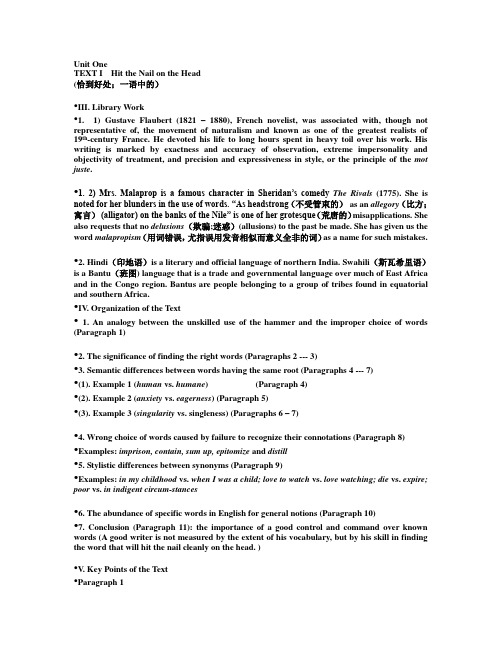
Unit OneTEXT I Hit the Nail on the Head(恰到好处;一语中的)•III. Library Work•1. 1) Gustave Flaubert (1821 –1880), French novelist, was associated with, though not representative of, the movement of naturalism and known as one of the greatest realists of 19th-century France. He devoted his life to long hours spent in heavy toil over his work. His writing is marked by exactness and accuracy of observation, extreme impersonality and objectivity of treatment, and precision and expressiveness in style, or the principle of the mot juste.•1. 2) Mrs. Malaprop is a famous character in Sheridan’s comedy The Rivals(1775). She is noted for her blunders in the use of words. ―As headstrong(不受管束的)as an allegory(比方;寓言)(alligator) on the banks of the Nile‖ is one of her grotesque(荒唐的)misapplications. She also requests that no delusions(欺骗;迷惑)(allusions) to the past be made. She has given us the word malapropism(用词错误,尤指误用发音相似而意义全非的词)as a name for such mistakes. •2. Hindi(印地语)is a literary and official language of northern India. Swahili(斯瓦希里语)is a Bantu(班图) language that is a trade and governmental language over much of East Africa and in the Congo region. Bantus are people belonging to a group of tribes found in equatorial and southern Africa.•IV. Organization of the Text•1. An analogy between the unskilled use of the hammer and the improper choice of words (Paragraph 1)•2. The significance of finding the right words (Paragraphs 2 --- 3)•3. Semantic differences between words having the same root (Paragraphs 4 --- 7) •(1). Example 1 (human vs. humane) (Paragraph 4)•(2). Example 2 (anxiety vs. eagerness) (Paragraph 5)•(3). Example 3 (singularity vs. singleness) (Paragraphs 6 – 7)•4. Wrong choice of words caused by failure to recognize their connotations (Paragraph 8) •Examples: imprison, contain, sum up, epitomize and distill•5. Stylistic differences between synonyms (Paragraph 9)•Examples: in my childhood vs. when I was a child; love to watch vs. love watching; die vs. expire; poor vs. in indigent circum-stances•6. The abundance of specific words in English for general notions (Paragraph 10)•7. Conclusion (Paragraph 11): the importance of a good control and command over known words (A good writer is not measured by the extent of his vocabulary, but by his skill in finding the word that will hit the nail cleanly on the head. )•V. Key Points of the Text•Paragraph 1•knock over: hit … to fall 捶翻•drive something home: force (the nail) into the right place; make something unmistakably clear 把(钉子等)打入;使明确无误•E.g. (1). He slammed the door and drove the bolt home. 他砰地关上门,把门闩插好。
(完整版)新编英语教程5册Unit1的答案
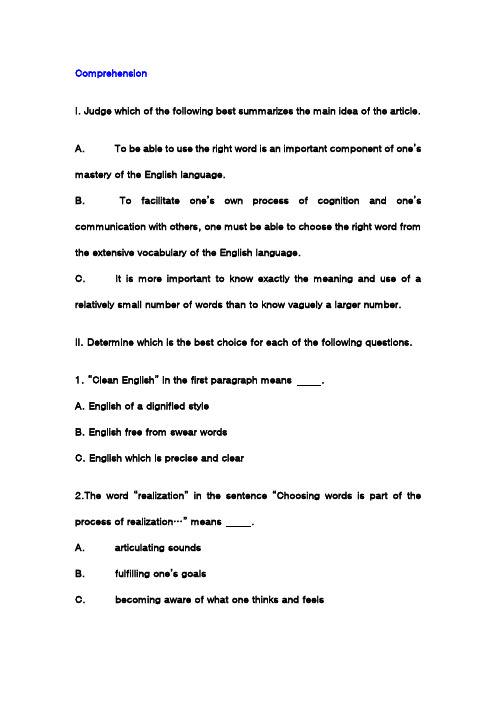
ComprehensionI. Judge which of the following best summarizes the main idea of the article.A. To be able to use the right word is an important component of one’s mastery of the English language.B. To facilitate one’s own process of cognition and one’s communication with others, one must be able to choose the right word from the extensive vocabulary of the English language.C. It is more important to know exactly the meaning and use of a relatively small number of words than to know vaguely a larger number.II. Determine which is the best choice for each of the following questions.1. “Clean English” in the first paragraph means .A. English of a dignified styleB. English free from swear wordsC. English which is precise and clear2.The word “realization” in the sentence “Choosing words is part of the process of realization…” means .A. articulating soundsB. fulfilling one’s goalsC. becoming aware of what one thinks and feels3. The example given in para. 3 of a man searching for the right word for his feelings about his friend illustrates the function words perform in .A. defining out thoughts and feelings for ourselvesB. defining our thoughts and feelings for those who hear usC. both A and B4. The word “cleanly” in the last sentence means .A. squarelyB. clearlyC. neatly5.The examples of the untranslatability of some words given in para. 11 best illustrate which sentence of the paragraph?A. The first sentence.B. The second sentence.C. The third sentence.III. Answer the following questions.1. Which sentence in the first paragraph establishes the link between the driving of a nail and the choice of a word?2. What does the word “this” in sent ence 1, para. 2, refer to?3. Do you agree with the author that there is a great deal of truth in the seemingly stupid question “How can I know what I think till I see what I say”?Why or why not?4. Explain why the word “imprison” in the example given in para. 9, though not a malapropism, is still not the right word for the writer’s purpose.5. What is the difference between “human” and “humane”? And the difference between “human action” and “humane action”, and also that between “human killer” and “humane killer”?6. What does the word “alive” in the sentence “a student needs to be alive to these differences” (para. 9) mean?7. Why is it difficult and sometimes even impossible to translate a word from one language into another as illustrated in para. 11? Supply some such examples with English and Chinese.8. The writer begins his article with an analogy between the unskilled use of the hammer and the improper choice of words. Identify the places where the analogy is referred to in the rest of the article.Language WorkI. Read the following list of words and consider carefully the meaning of each word. Then complete each of the sentences below using the correct form of an appropriate word from the list.Creep Loiter March Meander Pace Patrol Plod Prowl Ramble Roam SaunterShuffle Stagger Stalk Step Stride Strut Stroll Toddle Tramp Tread Trudge Walk1. After the maths examination Fred, feeling exhausted, across the campus.2. The soldiers reached their camp after 15 miles through the deep snow.3. It is pleasant to in the park in the evening.4. After the cross-country race Jack to the changing room.5. Last night when he sleepily to the ringing telephone, he accidentally bumped into the wardrobe.6. We saw him towards the station a few minutes before the train’s departure.7. The old couple through the park, looking for a secluded bench to sit on and rest.8. The newly-appointed general about the room like a latter-day Napoleon.9. Peter whistled happily as he along the beach.10. These old people liked to about the antique ruins in search of a shady picnic spot.11. Many tourists about the mall, windowshopping.12. We were fascinated by the view outside the room----a beautiful verdant meadow and brooks through it.13. Mary used to about the hills and pick wild flowers for her mother.14. Eager to see the pony in the stable, the children down the staircase, their hearts pounding violently.15. The lion had the jungle for a long time before it caught sight of a hare.16. My brother began to when he was ten months old.17. The farmers often let their horses freely in the meadow so that they could eat their fill of grass.18. The patrols were along through the undergrowth when the bomb exploded.19. The thugs were reported to be the streets for women workers who were on their way home after the afternoon shift.20. The first-year students not only learned how to , they were also taught how to take aim and shoot when they had military training.21. Sometimes Tom, our reporter, would up and down the study, deep in thought.22. When he was Third Street, Fred found the little match girl lying dead at the street corner.23. Secretaries hated seeing their new manager in and out of theoffice without even casting a glance at them.24. Mother asked us to lightly so as not to wake Granny.25. The refugees for miles and miles all day hunting for a place to work.26. When the pop singer out of the car, his fans ran to him, eager to get his autograph.27. The laborers on their way home after working in the plantation the whole day.28.The lion was feeling pretty good as he (A) through the jungle. Seeing a tiger, the lion stopped it.“Who is the King of the jungle?” the lion demanded.“You, O lion, are the King of the jungle,” replied the tiger.Satisfied, the lion (B) on, until he came across a large, ferocious-looking leopard.“Who is the King of the jungle?” asked the lion, and the leopard bowed in awe. “You, mighty lion, you are the King of the jungle,” it said humbly and (C) off.Feeling on top of the world, the lion proudly (D) up to a huge elephant an d asked the same question. “Who is the King of the jungle?”Without answering, the elephant picked up the lion, swirled him round in the air, smashed him to the ground and jumped on him.“Look,” said the lion, “there’s no need to get mad just because you didn’t know the answer.”II. Make a list of more specific words for each of the following general terms. For example, for WALK, you could list stride, stroll, saunter, plod, toddle and so on. Give sentences to illustrate how the words may be used.1. SAY2. SEE3. BEVERAGE4. EXCITEMENT5. DELIGHT6. SKILFULIII. In the following sentences three alternatives are given in parentheses for the italicized words. Select the one which you think is most suitable in the context.1. A clumsy (heavy, stupid, unskillful) workman is likely to find fault with his tools.2. As John was a deft (skillful, clever, ready) mechanic, he was hired by the joint-venture in no time.3. The writer made a point of avoiding using loose(vague, unbound, disengaged) terminology in his science fiction.4. We didn’t appreciate his subtle(delicate, tricky, profound) scheme to make money at the expense of the customers.5. Annie Oakley became famous as one of the world’s most precise (accurate, scrupulous, rigid) sharpshooters.6. The government in that newly-independent country has decided to make ashift (alteration, turn, transference) in its foreign policies.7. Misunderstanding arose on account of the vague(undetermined, confused, ambiguous) instructions on the part of the manager.8. If soldiers do not pay scrupulous (exact, vigilant, conscientious) attention to orders they will not defeat the enemy.9. In some areas, the virgin forest has been cut through ignorance (blindness, want of knowledge, darkness) of the value of trees.10. Since many pure metals have such disadvantages (harm, unfavourableness, drawbacks) as being too soft and being liable to rust too easily, they have little use.11. My colleague, Mr. Hill, has a small but well-chosen library, where it is said he spends most of his spare time cultivating(nourishing, tilling, developing) his mind.12. If you think photography is my hobby, your belief is quite mistaken (fraudulent, erroneous, deceitful).13. What appears to the laymen as unimportant (minute, trivial, diminutive) and unrelated facts is often precious to the archaeologist.14. The lounge has a seating capacity of 30 people but it is too dark (dim, dingy, gloomy) to read there.15. These career-oriented women are used to flexible (adaptable, willowy, docile) working hours in the office.16. Only experts with a professional eye can tell the fine(fair, pleasant,subtle) distinction between the two gems.17. The goose quill pen has a great sentimental (tender, emotional, soft) appeal to Emily as it was a gift from her best friend.18. Being thoughtful of and enthusiastic towards others is the essence (gist, kernel, quintessence) of politeness.19. When Iraq destroyed some of its nuclear and chemical weapons, it acted under coercion (repression, concession, compulsion).20. My uncle’s oft-repeated anecdotes of his adventures in Africa were fascinating (catching, pleasing, absorbing ) to listen to.IV. Give one generic term that covers each of the following groups of words.1. artificer, turner, joiner, carpenter, weaver, binder, potter, paper-cutter2. volume, brochure, pamphlet, treatise, handbook, manual, textbook, booklet3. painter, sculptor, carver, poet, novelist, musician, sketcher4. grin, smirk, beam, simper5. donation, subscription, alms, grant, endowment6. bandit, poacher, swindler, fraud, embezzler, imposter, smuggler7. nibble, munch, devour, gulp8. drowse, doze, slumber, hibernate, coma, rest, nap9. manufacture, construct, weave, compose, compile10. ancient, antique, old-fashioned, obsolete, archaic11. slap, tap, pat, thump, whack12. alight, descend, dismount, disembarkV. Fill in each blank with an appropriate word.In discussing the relative difficulties of analysis which the exact and inexact sciences face, let me begin with an analogy. Would you agree that swimmers are (1) skilful athletes than runners (2) swimmers do not move as fast as runners? You probably would (3) . You would quickly point out (4) water offers greater (5) to swimmers than the air and ground do to (6) Agreed, that is just the point. In seeking to (7) their problems, the social scientists encounter (8) resistance than the physical scientists. By (9) I do not mean to belittle the great accomplishments of physical scientists who have been able, for example, to determine the structure of the atom (10) seeing it. That is a tremendous (11) yet (12) many ways it is not so difficult as what the social scientists are expected to (13) . The conditions under which the social scientists must work would drive a (14) scientist frantic. Here are five of (15) conditions. He can perform (16) experiments; he cannot measure the results accurately; he (17) control the conditions surrounding (18) experiments; he is of the expected to get quick results(19) slow-acting economic forces; and he must work with people,(20) with inanimate objects…VI. Following Warner’s model of establishing an analogy between two dissimilar things, write a passage, discussing the learning of a foreign language. You are supposed to use an analogy to help you explain. For instance, you may compare the learning of a foreign language to that of swimming, bike-riding, etc.UNIT 1 TEXT 1Exercises KeysComprehension:I. B ;II. 1.C 2.C 3.C 4.A 5.C ;III. 1. “So with language; …firmly and exactly.”2. Getting the word that is completely right for the writer’s purpose.3. Yes, I do. It sounds irrational that a person does not know what he himself thinks before he sees what he says. But as a matter of fact, it is quite true that unless we have found the exact words to verbalize our own thoughts we can never be very sure of what our thoughts are; without words, our thoughts cannot be defined or stated in a clear and precise manner.4. “Malapropism” means the unintentional misuse of a word by confusing it with one that resembles it, such as human for humane, singularity for singleness. But the misuse of “imprison” is a different case. It is wronglychosen because the user has failed to recognize its connotation.5. human=of, characterizing, or relating to manhumane=characterized by kindness, mercy, sympathyThus: human action=action taken by man; humane action=merciful action; human killer=person that kills humans ; humane killer=that which kills but causes little pain6. sensitive, alert7. Those are words denoting notions which are existent only in specific culture, not universally shared by all cultures. English words difficult to be turned into Chinese: privacy, party, lobby (v.), etc. Chinese words difficult to be turned into English: 吹风会,粽子,五保户,etc.8. “We don’t have to look far afield to find evidence of bad carpentry.”“It is perhaps easier to be a good craftsman with wood and nails than a good craftsman with word s.”“A good carpenter is not distinguished by the number of his tools, but by the craftsmanship with which he uses them. So a good writer is not measured by the extent of his vocabulary, but by his skill in finding the ‘mot juste’, the word that will hit t he nail cleanly on the head.”Language Work:I. 1. shuffled/trudged 2. trudging 3. stroll 4. staggered 5. staggered 6. striding 7. strolled 8. strutted 9. sauntered/strolled 10. ramble/roam 11.loitered 12. meandering 13. roam 14. crept 15. prowled 16. toddle 17. roam 18. creeping 19. prowling 20. march 21. pace 22. patrolling 23. stalking 24. tread 25. tramped 26. stepped 27. plodded 28. A. prowled/strutted B. strolled/sauntered C. walked/crept D. marched/struttedII.1.SAY: speak, tell, declare, pronounce, express, state, argue, affirm, mention, allege, recite, repeat, rehearse2. SEE: behold, look at, glimpse, glance at, view, survey, contemplate, perceive, notice, observe, discern, distinguish, remark, comprehend, understand, know3. BEVERAGE: liquor, wine, beer, tea, coffee, milk drink, soft drink4. EXCITEMENT: agitation, perturbation, commotion, disturbance, tension, bustle, stir, flutter, sensation5. DELIGHT: joy, gladness, satisfaction, charm, rapture, ecstasy, pleasure, gratification6. SKILFUL: apt, ingenious, handy, ready, quick, smart, expert, capable, able, gifted, talented, dexterous, cleverIII. 1. clumsy----unskillful 2. deft----skillful 3. loose----vague 4. subtle----tricky 5. precise----accurate 6. shift----alteration 7. vague----ambiguous8. scrupulous----conscientious 9. ignorance----want of knowledge 10. disadvantages----drawbacks 11. cultivation----developing 12.mistaken----erroneous 13. unimportant----trivial 14. dark----dim 15. flexible----adaptable 16. fine----subtle 17. sentimental----emotional 18. essence----quintessence 19. coercion----compulsion 20. fascinating----absorbingIV. 1. craftsman 2. book/publication 3. artist 4. smile 5. contribution 6. law-breaker 7. eat 8. sleep 9. make 10. old 11. hit 12. get offV. 1. less 2. because/since/as 3. not 4. that 5. resistance 6. runners 7. solve 8. greater/more 9. that 10. without 11. achievement/feat 12. in 13. do 14. physical 15. those 16. few 17. cannot 18. the 19. with 20. not。
(完整word版)新编英语教程5(1-12)课文翻译.docx
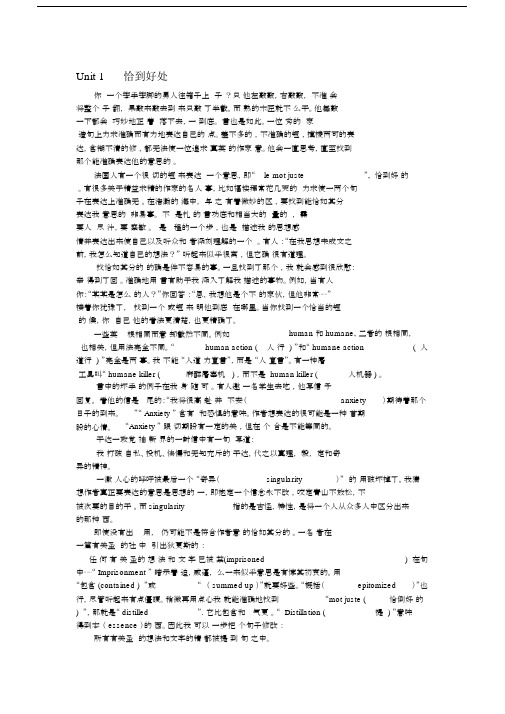
Unit 1恰到好处你一个笨手笨脚的男人往箱子上子?只他左敲敲,右敲敲,不准会将整个子翻,果敲来敲去到来只敲了半截。
而熟的木匠就不么干。
他每敲一下都会巧妙地正着落下去,一到底。
言也是如此。
一位秀的家造句上力求准确而有力地表达自己的点。
差不多的,不准确的短,摸棱两可的表达,含糊不清的修,都无法使一位追求真英的作家意。
他会一直思考,直至找到那个能准确表达他的意思的。
法国人有一个很切的短来表达一个意思,即“ le mot juste”, 恰到好的。
有很多关于精益求精的作家的名人事,比如福楼拜常花几天的力求使一两个句子在表达上准确无。
在浩瀚的海中,与之有着微妙的区,要找到能恰如其分表达我意思的非易事。
不是扎的言功底和相当大的量的,需要人尽汁,要察敏。
是程的一个步,也是描述我的思想感情并表达出来使自己以及听众和者深刻理解的一个。
有人:“在我思想未成文之前,我怎么知道自己的想法?” 听起来似乎很离,但它确很有道理。
找恰如其分的的确是件不容易的事。
一旦找到了那个,我就会感到很欣慰:辛得到了回。
准确地用言有助于我深入了解我描述的事物。
例如,当有人你:“某某是怎么的人?”你回答:“恩,我想他是个不的家伙,但他非常⋯⋯”接着你犹豫了,找到一个或短来明他到底在哪里。
当你找到一个恰当的短的候,你自己他的看法更清楚,也更精确了。
一些英根相同而意却截然不同。
例如human 和 humane, 二者的根相同,也相关,但用法完全不同。
“human action (人行 ) ”和“ humane action( 人道行 ) ”完全是两事。
我不能“人道力宣言”,而是“人宣言”。
有一种屠工具叫“ humane killer (麻醉屠宰机 ) ,而不是 human killer (人机器 ) 。
言中的坏手的例子在我身随可。
有人邀一名学生去吃,他写信予回复。
看他的信是尾的:“我将很高赴并不安(anxiety)期待着那个日子的到来。
”“ Anxiety ”含有和恐惧的意味。
新编实用英语(第四版)视听说初级教程(上)课件U10
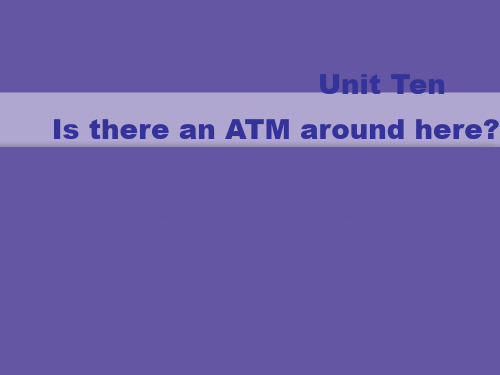
UUnniitt| TOenne
□ looks at Doug
□ excited
UUnniitt| TOenne
Visual Audio Oral
C. MATCH. Watch the video again. Match the questions and answers by writing the letter in the blank. Some questions have more than one answer.
Tom's body language
Tom's facial expressions I think Tom is feeling…
□
□ smiles
□ scared
□
□ frowns
□ happy
□
□ looks up at the sky
□ sad
□
□ closes eyes
□ annoyed
UUnniitt| TOenne
Visual Audio Oral
Unit Focus
Vocabulary:
across from downtown post office between information booth street convenience store neighborhood
批注本地保存成功开通会员云端永久保存去开通
Visual Audio Oral
Unit Ten Is there an ATM around here?
Unit | One
Visual Audio Oral
Neighborhood
What You Should Learn to Do 1. Ask questions about
新编英语教程5 (Unit1-10)单词

Unit One Hit the Nail on the Head1. drive sth home: force (the nail) into the right place; make sth unmistakably clear.2. scrupulous: painstaking meticulous3. far afield: very far away4. rife:1) widespread common 2)full of5. leader: British English for newspaper editorial6. coercion: pressure compulsion7. epitomize: be typical of; serve as the typical example of8. disprove: prove to be contrary; refute9. expire: die pass away; come to an end10. indigent: poverty-stricken pennilessUnit Two Beware the dirty seas1. sluice: (v.) to pour as if from a sluice(水闸),i.e. a man-made passage for water fitted with a gate for stopping and regulating the flow; (n.) a channel controlling water flow2. nurture: further the development of; care for3. evolve: develop gradually (by a long continuous process)4. endemic: (of a disease) found regularly in a particular place5. litany: repetition. The literal meaning of“litany”is“a prayer consisting of a series of invocations and supplications by the leader with respo nses by the congregation”.6. flush: pour; flood with water to clean out (See dictionary)7. lurk: exist unseen8. effluent: liquid wastes such as chemicals or sewage that flows out from a factory or some other places into a river or the sea9. plankton: very small forms of plant and animal life that live in a body off water浮游生物10. slime: unple asa nt sticky substance such as the thick sticky liquid on the skin of various fishUnit Three My Friend Albert Einstein1. knack: a clever way of doing things2. be in awe of: have respect as well as fear and reverence for3. staggering: unexpectedly surprising; astounding4. vestiges: traces5. ultimately: finally; after a long series of time6. recalcitrant: hard to deal with; unmanageable7. worry: assail a problem again and again until it is solved just like a dog biting some small animals repeatedly shaking it or pulling it with the teeth8. surcease: (archaic) cessation pause9. plausible: seeming to be reasonable10. a house of cards: an insecure scheme11. ineffable: unutterable; incapable of being expressed in words12. elusively whimsical: indescribably quaint or strangeUnit Four The Invisible Poor1. perennial: lasting forever or for a long time2. rutted roads: roads with deep narrow marks made by the wheels of vehicles3. be exempt from: be freed from a duty. service payment etc.4. tenement: a large building especially one in the poor part of a city which is divided into small flats which are rented cheaply5. affluent: wealthy prosperous6. compound v.: /kom'paund/ make worse by adding (something) to . . . (often used in the passive)7. existential: relating to human experience (a formal-word)8. lurid: sensational shocking9. dispossessed: people who have lost all their possessions10. cynical: doubtful as to whether something will happen or whether it is worthwhile11. involvement: connection12. old rhetoric of reform: writings about reform in the past that sounded fine and important but were really insincere and meaninglessUnit Five The Plug—in Drug:TV and the American FamilyPartⅠ1. afflict: trouble2. asset: valuable object; advantage3. preposterous: unthinkable abs urd4. splintering: splitting breaking up5. the peer group: a group of people of the same age class position. etc. here group of children of the same age6. television-oriented: interested in and influenced by TV7. equivocal: ambiguous8. sorcerer: person who performs magic by using the power of evil spirits9. stint: fixed amount of work: here the fixed TV programme10. conjure up: bring into the mind11. san e: (in this context) in possession of good relations/of a close bond12. backlog: a reserveUnit Six Preparing for College1. driving motive: the incentive / encouragement that urges them on;2. the rudiments: the basics the fundamentals (The word rudiments is always in the plural form when used in this sense.)3. metaphysics: the branch of philosophy that deals with abstract concepts etc.形而上学,玄学,纯粹哲学4. conscious culture: the culture (i.e. customs arts etc) that is directly perceptible or known to us5. fanatic: one who is very enthusiastic about a particular activity6. personify: express or represent ( a quality in human form)7. sedentary: inactive; done while sitting down8. underline: indicate the importance of9. balked: baffled; frustrated10. a maddening lot: a wild uncontrollable group11. righteous sects: morally justifiable groups of people whose religious beliefs are considereddifferent form those of a larger group12. relish:味味道兴趣;开胃小菜;great enjoymentUnit Seven Grouping the Gifted:Pro1. innate: belonging to an individual from birth2. pursuit: an activity that one engages in as a profession vocation or avocation3. athlete: person who practises athletics; competitor or skilled performer in physical exercises4. heterogeneously: in such a way that members are very different from one another5. criterion /--ia: standard on which a decision may be based6. snob: one who has an offensive air of superiority (here in matters of knowledge)7. elite: a socially superior group8. instill: put (ideas etc. ) gradually but firmly into someone's mind by continuous effort9. spark: encourage; stimulate into greater activity10. latent: present and capable of becoming though not now visible or active11. skyrocket: rise or increase rapidly12. pay dividends: produce an advantage. especially as a result of an earlier action (dividend: that part of the money made by a business which is divided among those who own shares in the business红利)Unit Eight Why Nothing Works1. savant: a man of learning especially a person with detailed knowledge in some specialized field2. corollary: an immediate inference from a proved proposition3. forestall: defeat prevent by prior measures4. commitment: a pledge to follow certain beliefs or a certain course of action; devotion (to duty etc. )5. artifact: a usually small object (as a tool or an ornament) showing human workmanship that has special historical interest6. evoke: bring to mind7. projectile point: the tip of a weapon that is thrust forward; spear or arrowhead8. band: a group of people formed for some common purpose and often with a leader9. barter: trade by exchanging one commodity for another10. alienation: a withdrawing or separation of a person from an object or position of former attachment; a feeling of not belonging to or being part of one's surroundingsUnit Nine Where Is the News Leading Us?1. symposium: a conference in which experts or scholars discuss a certain subject2. scrutinize: examine very closely and carefully3. distortion: misrepresentation; a false or dishonest account4. eruptive: (in this context) sensational shocking disturbing5. collide with: crash violently into; run into (one another)6. ingredient: a component part of something7. inhibitor: one who holds back prevents8. deplete: exhaust use up reduce9. cynicism: disbelief in the sincerity of human motives10. antidote: remedy corrective; something that prevents or counteracts11. envision: picture mentally imagine visualize12. caricature: a picture ludicrously滑稽的exaggerating the peculiarities or defects of persons or thingsUnit Ten Things:The Throw—Away Society1. Humanoid: having human form or characteristics2. texture: the degree of roughness or smoothness coarseness or fineness of a substance or material especially as felt by touch; visual and tactile qualities of a surface3. staggering: stunning wondrous breathtaking4. deride: laugh at contemptuously; to scoff at or mock5. transience: temporariness impermanence; the quality or state of being temporary or impermanent。
新编英语教程5__unit_five
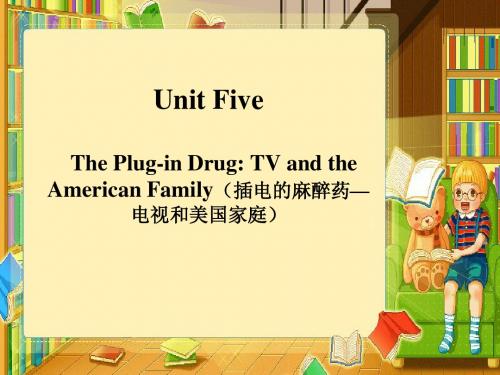
• The average American has his set turned on for about 6.5 hours each day.
Байду номын сангаасII. Library Work
• TV has become the primary entertainment and information medium in the U.S. In 1974, the Bureau of the Census reported that 97% of U.S. households contained at least one TV set and 45% had 2 or more sets. The average American has his set turned on for about 6.5 hours each day. In fact TV has become the American’s eyes and ears on the world.
IV. Organization of the Text
• C. Negative effects (as perceived today) (Paragraphs 6 – 13): • 1. too much time devoted by children to TV-watching (Paragraphs 6 – 7) • 2. a general lack of communication within peer groups (Paragraph 8) • 3. a widening gap in the relations between children and their parents (Paragraphs 9 – 10)
新编实用英语教程Unit 5
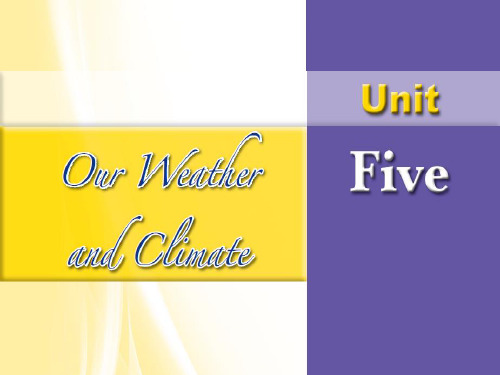
Unit | Five
Back
Unit | Five
Following Sample Dialogues
4 Read the following sample dialogues and try to perform your own tasks.
Unit | Five
Back
Unit | Five
Putting Language to Use
5 Mrs. Parks is talking about the weather of two places in the United States with her students. Read aloud the following dialogue with your partner by putting in the missing words. How is the weather Mrs. Parks: 1 ____________________ in California? Student A: It's always warm.
B) It's noisy. D) It's wet. B) No problem. D) It's popular there. B) There is a chance of rain. D) That's terrible. B) How about you? D) Yes, it is. B) Thank you. D) That's nothing. B) Many thanks. D) What does the weatherman say?
Unit | Five
Key: 1-f, 2-h, 3-i, 4-j, 5-g, 6-c, 7-e, 8-d, 9-a, 10-b
新编英语教程5UnitT

• E.g.: The new type engines feature high speed, small size and economical operating costs.
• 这种新型发动机以高速、小型和操作费用低为特色。
• Round-the-clock service features this store. • 日夜服务是这家商店的特色。
• 近似的公正
a
22
Paragraph 10
• sumptuous: grand and expensive • 豪华的;华丽的;奢侈的
• E.g.: sumptuous furniture / meal / evening dress
a
23eature: advertise as a special feature • 以…为特色;是…的特色
a
6
Paraphrase 1
Moreover, Mattel announce…for her old one. (para. 2)
Moreover, Mattel made public that, for the first time, all girls desire to buy a Barbie from its company were to be given the right of turning in their old dolls in exchange for new models at a reduced price.
• b. give one’s whole attention to and esp. learn about (sth)
• E.g.: I have a talk to give on the famous writer next month, so first I must steep myself in his books.
新编实用英语综合教程第五单元-W.pps
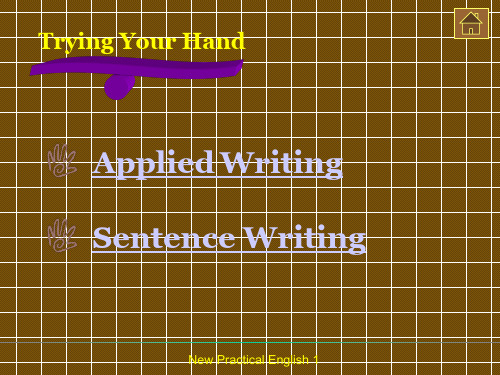
市区天气: 今天多云转少云,北风5~6级减弱到4~5级,最高 气温1℃, 最低气温-4℃。预计大连地区明后两 天少云,风力不大,气温变化不大。
New Practical English 1
Simulate and Create
KEY Weather outlook for the urban area:
9. Robert attended several important business meetings in the last three years.
has attended
10. So far they already got six traveler’s checks. have already got
2. 她在这个办事处工作已有5年了。
She has worked in this office for 5 years.
New Practical English 1
Write Through Translating
3. 去年我游览了长城,而且玩得特别开心。
I paid a visit to the Great Wall last year and had a very good time there.
3. He has worked for this large company for many years.
4. He graduated from Florida State University in 1990.
P
P
PP
PP
5. We had the same weather in Detroit last year.
haven’t seen
2. Gina is in college for one year.
新编英语教程5UnitTenPPT课件

3
Evaluation
Midterm and final exams to assess student progress.
02 Unit content
Background of the text
01
02
03
04
The text is a story about a group of friends who go on a road trip to a music
Speaking
Role-plays and group discussions on various topics.
Course outline
1 2
Unit 5
Project and Evaluation
Project
Preparation of a short presentation on a chosen topic.
The text includes a variety of phrasal verbs and colloquial expressions that enrich the language and add authenticity.
单击此处添加正文,文字是您思想的为了最终呈 现发布的。单击此处添加正文文字是您思。文字 是您思。单击此处添加正文文字是您思。文字是 您思。4行*21字
新编英语教程第三版第五单元课件
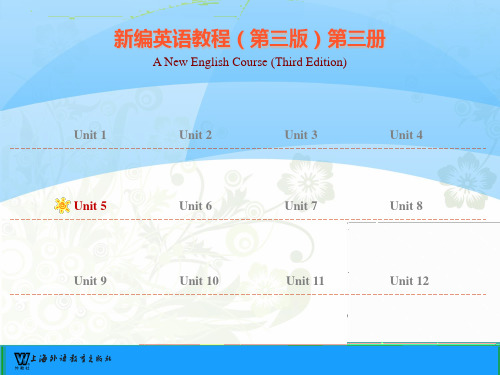
Movie Clip Quotes
新编英语教程(第三版)第三册
Unit 5 On Not Answering the Telephone
unit2unit3unit1unit4新编英语教程第三版第三册新编英语教程第三版第三册anewenglishcoursethirdeditionunit6unit7unit8unit9unit10unit5unit11unit12unit5onnotansweringthetelephoneleadleadininlisteninginandspeakingoutlisteninginandspeakingouttextoralworkguidedwritingcomprehensiveexercisestextoralworkguidedwritingcomprehensiveexercisesmovieclipquotesquotes新编英语教程第三版第三册unit5onnotansweringthetelephoneleadlead
新编英语教程(第三版)第三册
Unit 5 On Not Answering the Telephone
Lead-In Listening In and Speaking Out Text Oral Work Guided Writing Comprehensive Exercises
- You OK? - Yeah. - ... and pairs auditions for our two leads. - Pfft. - Mr. Danforth, this is a place of learning, not a hockey arena. There is also a final sign-up for next week’s scholastic decathlon competition. Chem Club president Taylor McHessey can answer all of your questions about that. Ah, the cell phone menace has returned to our crucible of learning. - Is it your phone?
新编英语教程5unitten
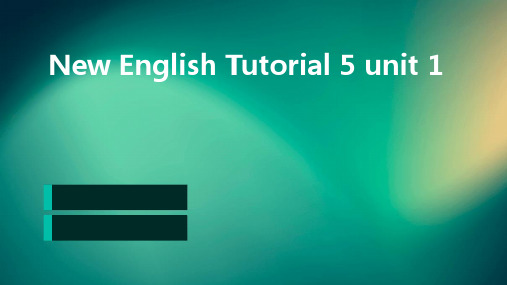
02
社会变革
工业革命带来了许多社会变革,如城市化、人口流动、工人权益等问题。
本单元将深入探讨这些变革对当时社会和人们生活的影响。
03
环境问题
工业革命也带来了严重的环境问题,如空气污染、水污染和土地资源的
过度开发。本单元将分析这些环境问题的成因和后果,以及当时的政府
和社会如何应对这些问题。
03 Vocabulary learning
05 reading comprehension
Reading materials
Textbook
The New English Tutorial 5, unit 1 provides a selection of reading materials, including articles, essays, and short stories, covering a range of topics and genres.
• Responsibility - The Captain or a designated member of the crew must oversee the lifeboat drill. They will ensure that all crew members are present and participate, and will complete a checklist to verify that all aspects of the drill have been properly carried out.
• Procedure - The lifeboat drill is a safety measure that must be carried out on board a ship. It involves checking the lifeboat and its equipment, and ensuring that all crew members know how to use it in case of an emergency.
新编英语教程5 Unit 9 Where Is the News Leading Us
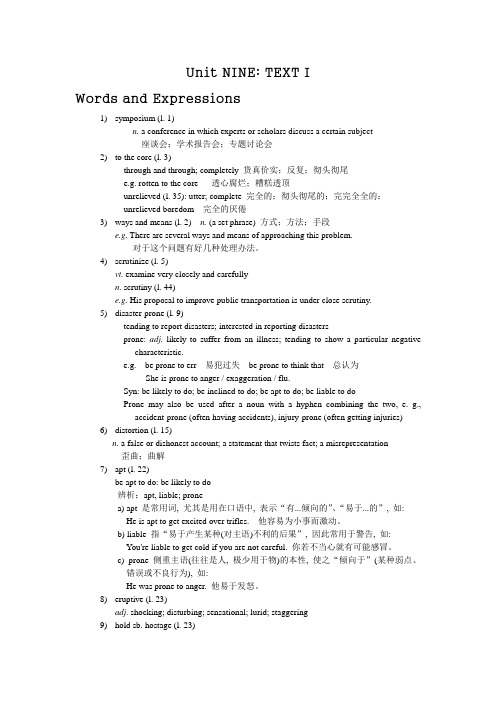
Unit NINE: TEXT IWords and Expressions1)symposium (l. 1)n. a conference in which experts or scholars discuss a certain subject座谈会;学术报告会;专题讨论会2)to the core (l. 3)through and through; completely 货真价实;反复;彻头彻尾e.g. rotten to the core 透心腐烂;糟糕透顶unrelieved (l. 35): utter; complete 完全的;彻头彻尾的;完完全全的:unrelieved boredom 完全的厌倦3)ways and means (l. 2) n. (a set phrase) 方式;方法;手段e.g. There are several ways and means of approaching this problem.对于这个问题有好几种处理办法。
4)scrutinize (l. 5)vt. examine very closely and carefullyn. scrutiny (l. 44)e.g. His proposal to improve public transportation is under close scrutiny.5)disaster-prone (l. 9)tending to report disasters; interested in reporting disastersprone: adj.likely to suffer from an illness; tending to show a particular negative characteristic.e.g. be prone to err 易犯过失be prone to think that 总认为She is prone to anger / exaggeration / flu.Syn: be likely to do; be inclined to do; be apt to do; be liable to doProne may also be used after a noun with a hyphen combining the two, e. g., accident-prone (often having accidents), injury-prone (often getting injuries)6)distortion (l. 15)n. a false or dishonest account; a statement that twists fact; a misrepresentation歪曲;曲解7)apt (l. 22)be apt to do: be likely to do辨析:apt, liable; pronea) apt 是常用词, 尤其是用在口语中, 表示“有...倾向的”、“易于...的”, 如:He is apt to get excited over trifles. 他容易为小事而激动。
- 1、下载文档前请自行甄别文档内容的完整性,平台不提供额外的编辑、内容补充、找答案等附加服务。
- 2、"仅部分预览"的文档,不可在线预览部分如存在完整性等问题,可反馈申请退款(可完整预览的文档不适用该条件!)。
- 3、如文档侵犯您的权益,请联系客服反馈,我们会尽快为您处理(人工客服工作时间:9:00-18:30)。
Paragraph 8
• steep in: a. place and leave (sth) in (liquid) for a long time; • E.g.: If the clothes are very dirty, steep them in soapy water overnight.
Paraphrase 3 Nothing could be…from sheer age. (para. 6) This difference seems most noticeable between the modern girls who are delighted in replacing their out-of-date Barbies for the new ones, and their mothers and grandmothers, who are reluctant to part with their dear little dolls until they are timeworn and broken .
Paragraph 2
trade-in allowance: a reduced price one pays when one trade in something old for a new one 以旧换新打折价
Paraphrase 1 Moreover, Mattel announce…for her old one. (para. 2) Moreover, Mattel made public that, for the first time, all girls desire to buy a Barbie from its company were to be given the right of turning in their old dolls in exchange for new models at a reduced price.
• clutch lingeringly and lovingly to the same doll: hold on to the same old doll faithfully / persistently / with devotion and with love
Paragraph 6
• Transient and temporary are synonyms, but they are different in that temporary signifies “lasting for a time” (暂时的 暂时的) 暂时的 while transient means “existing only for the moment” (稍纵即逝的 稍纵即逝的). 稍纵即逝的 “The moods were many and transient.” “心绪纷繁但往往如过往烟云”
Paragraph 8
run counter to: conflict with; oppose; be opposite to E.g.: The government’s actions run counter to their election promises. run counter to / go against the grain: be contrary to one’s inclination(癖好,意向) (癖好, or disposition(气质,性情) (气质,
2.
3.
II. Relevant Information 1. Los Angeles: Los Angeles is the largest city in California and the second-largest urban area in the U.S. Its population is 10,103,000 (in 2004). 2. London: It has a population of 7,172,036 (2001 census). 3. Paris: 2,107,700 (2004)
特色。 特色。
• Round-the-clock service features this store. • 日夜服务是这家商店的特色。 日夜服务是这家商店的特色。
Paragraph 12
• devil-may-care: careless, and wild in behavior; reckless • 不顾一切的;轻率的,漫不经心的; 不顾一切的;轻率的,漫不经心的; • E.g.: a devil-may-care approach to life • 无忧无虑的处世态度
Paragraph 7
• She is inextricably embedded in a throw-away culture: she becomes a part of the throw-away society from which she cannot break away
Paragraph 7
Paragraph 7
• embed: fix firmly and deeply in a mass of surrounding substance • E.g.: He exerted so much strength that his knife got embedded in the chopping block. • A splinter (破片) was embedded in my finger.
IV. Key Points of the Text
Paragraph 1 eminently: very; perfectly 不寻常地,非常 E.g.: The discussion is eminently practical.
讨论非常实际。
His articles are comprehensive and eminently comprehensible.
Paragraph 5
• deride: laugh at or make fun of (sth considered worthless) • 嘲笑;嘲弄 嘲笑; • E.g.: They derided his notion that man can conquer space.
Paragraph 6
• b. give one’s whole attention to and esp. learn about (sth) • E.g.: I have a talk to give on the famous writer next month, so first I must steep myself in his books.
Paragraph 10
• sumptuous: grand and expensive • 豪华的;华丽的;奢侈的 豪华的;华丽的; • E.g.: sumptuous furniture / meal / evening dress
Paragraph 12
• feature: advertise as a special feature • 以…为特色;是…的特色 为特色; 为特色 的特色 • E.g.: The new type engines feature high speed, small size and economical operating costs. • 这种新型发动机以高速、小型和操作费用低为 这种新型发动机以高速、
使经济保持高速增长
Paragraph 7
• ruthlessly eliminated: done away with / thrown out completely • The normal meaning of ruthlessly is “cruelly, mercilessly.” In this context, it means “firmly and completely.” • E.g.: A decision was made ruthlessly to carry through the reform.
他的文章内容丰富又特别易于理解。
Paragraph 2
humanoid: (esp. of a machine) having human shape or qualities 似人的, 似人的,有人类特点的 Eg., The doll has a twist-and-turn waist that makes her more humanoid than before.
Unit Ten
Things: The Throw-Away Society
I. 1.
Pre-reading Questions After you have eaten a paper bag of apples, do you keep the bag or throw it away? If the fruit comes in a good plastic bag, how do you dispose of the plastic bag? Suppose you have an old watch which is out of order. Would you have it repaired or buy a new one and throw the old one away? If it is not you but your grandmother who has the plastic bag and the watch, what is she most likely to do with them?
